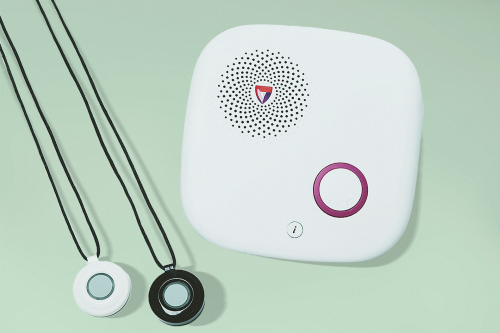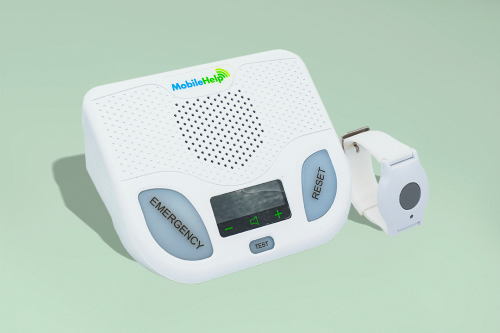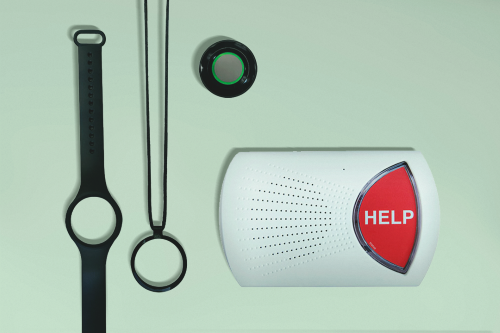Table of Contents
- Overall, we do not recommend Life Alert due to non-transparent pricing and sales processes.
- Life Alert devices range from $49.95–$98.85 per month, with an additional installation fee of $197.
- Life Alert products must be purchased over the phone, which some users may find inconvenient. Sales reps tend to be pushy and make inaccurate claims.
Thanks to its memorable catchphrase (“Help, I’ve fallen and I can’t get up!”), Life Alert may be the first company that comes to mind when you think about a medical alert system to protect against falls and other emergencies in the home. Medical alert systems or “personal emergency response systems,” like Life Alert, make it possible to get help quickly if you fall.
Research shows standing up or getting medical treatment (when required) within one hour of a fall reduces fall-related fear and anxiety among older people while also decreasing the risk of physical complications, like infections or pressure sores.
But through our hands-on testing, we’ve found Life Alert is no match for competitors.
In addition to a three-year contract, strict cancellation policies, and no automatic fall detection, our mystery shopping uncovered troubling behavior from sales representatives and a distinct lack of transparency around prices and contracts.
In this review, we’ll tell you exactly what Life Alert sales representatives told us, debunk many of their claims, and help you find a more affordable medical alert system that does the same thing—or better.
Which medical alert system is right for you?
- Life Alert: Not recommended.
- Medical Guardian: Best mobile system.
- MobileHelp: Best value.
- Bay Alarm Medical: Best at-home fall detection.
Why HelpGuide cares about older adult safety




The mental health of older adults is closely connected to feelings of independence, security, and connection. Older adults experiencing loneliness and social isolation tend to have a much higher risk of depression, anxiety, and suicide, as well as dementia, heart disease, and stroke, according to research.
Luckily, studies have shown older adults who use medical alert systems are more active and independent around the home, have a greater sense of security, and have overall improved mental health.
Independence is closely tied to one’s sense of identity, especially in older adults. Being able to perform daily tasks, make decisions, and live without constant assistance reinforces the feeling of being competent and valuable. A loss of independence can, unfortunately, erode this sense of self-worth.
Ryan Sultan, medical director of Integrative Psych and a research professor at Columbia University
Maintaining autonomy is directly related to mental health and quality of life. That’s why we’ve made it our mission to share the best information about medical alert systems that can help keep care recipients healthy, safe, and active.
Because our Handbook Team tests every medical alert brand we review, we can feel confident in the recommendations we make for our readers. We also consult with gerontologists (experts in older adult care), researchers, and industry leaders in older adult safety, as well as mental health experts, to vet our choices.
Importantly, we put ourselves in the consumer’s shoes by mystery shopping brands and walking through the set-up process—just like new customers—and we survey users and interview real people who use medical alert systems.
To formulate the strongly informed perspective we’re sharing with you here, we’ve compiled our testing data, interview and survey results, and insights from older adults and care providers.
Learn more about our medical alert systems review methodology.
HelpGuide Handbook for Life Alert
Our Life Alert testing experience
The Handbook Team has tested 23 devices from nine medical alert system companies, but Life Alert wasn’t among them. Our preliminary research quickly showed that Life Alert was expensive, outdated, and restrictive compared to dozens of affordable no-contract systems. The brand was unlikely to outrank the competition on these factors alone, so we opted not to test the equipment or the $3,600 monitoring service (the total cost of the most expensive three-year package).
Still, we wanted to learn more about this notoriously opaque brand, so we asked four testers to become mystery shoppers. Our testers called Life Alert customer service to request a free brochure, confirm prices, clarify some policies, and get a general sense of how the company treats its customers.
These phone calls didn’t go well. For starters, Life Alert representatives were rude and pushy when we asked questions or demonstrated reluctance to share personal and financial information.
From our tester
“The Life Alert sales representative’s attitude completely changed when I said I wasn’t ready to buy. It was almost like they were sneering at me. I said I wanted to do more research, and they responded, ‘What do you mean, research?’ as if that was a foolish thing to do.”
We also noted sales reps making many inaccurate claims, including that they have twice the number of dispatchers per customer compared to other companies. As such, we fact-checked the brand’s sales pitches by talking to lawyers, firefighters, EMS dispatchers, and other medical alert companies.
We use a workforce management solution that automatically schedules enough staff to handle alarm traffic during peak and off-peak periods of the day, hour by hour. This solution reviews historical data to determine staffing needs. During periods of unexpected heightened alarm traffic, we have on-call staff readily available to assist as needed.
Bay Alarm Medical, in response to our question about staffing ratios
We verified that Life Alert does have a few unique offerings, but we can’t reconcile them with the brand’s high costs, limited equipment, strict three-year policy, and questionable sales tactics.
What we like about Life Alert
1. Life Alert offers concierge services for non-emergencies
The Life Alert representative we spoke to made it clear that the Life Alert button can be pressed any time the person needs help, whether it’s a life-threatening emergency or a request for information.
Just about the only thing we can’t do is order you takeout.
Life Alert sales representative
If a break-in is in progress, for example, the monitoring center staff members will remotely increase the volume on the base unit and loudly inform the intruder that the police have been called.
Other examples they gave include:
- Getting a plumber to fix a burst pipe in the middle of the night.
- Calling loved ones when the phone is out of reach.
- Talking to a medical doctor, pharmacist, or veterinarian.
- Obtaining information about extreme weather conditions and how to take shelter.
- Calling a utility company to make a service appointment or ask a question.
This level of service is unprecedented in the medical alert industry and may make Life Alert worth every penny, depending on the person’s circumstances. The only other medical alert company that comes close to offering similar services is Lively.
2. The mobile system doesn’t need to be charged
The Life Alert on-the-go system uses a lithium-ion battery that lasts seven to 10 years. Life Alert monitors the battery level remotely and sends a new device when the old battery gets low. This long-lasting battery means there’s no reason to take the device off for charging, which could leave a person vulnerable in an emergency.
3. The shower button has a built-in speaker
Life Alert is the only medical alert company besides Aloe Care Health to sell a wall button with a built-in speaker, and we’re surprised more brands haven’t offered something similar. With other in-home systems, only the base unit has a speaker. It can be difficult to hear or be heard when this base unit is in the living room and you’ve fallen in the bathroom with the shower running, for example. All medical alert companies will dispatch emergency services if they can’t hear you, but it’s nice to be able to communicate your needs and request the exact type of help you need.
Most of our emergency calls come from the shower button.
Life Alert sales representative
It can go anywhere in the house, but Life Alert calls it the Shower Button because the brand recommends placing it low on the shower or bathroom wall. The bedroom, stairs, and bathroom are the top three locations where people 65 and older fall in the home, so it’s smart to put a button near the floor in all of these areas just in case you or your care recipient takes off the wearable button.
What we don’t like about Life Alert
1. You can’t buy Life Alert online
Life Alert is the only medical alert system that must be bought over the phone. As we discovered through our mystery shopping experience, Life Alert wants you to call so that a sales representative can upsell products. They pitched the most expensive package without telling us that other, more affordable options existed. If we didn’t know any better from prior research, we might have easily thought everyone pays $98.85 per month for Life Alert.
We’d like to see Life Alert offer more transparent pricing and contract terms through an online shopping portal.
2. It’s difficult to get accurate information about Life Alert
We found multiple versions of the Life Alert website that displayed slightly different information, making it difficult to know which one to trust. To make things more confusing, the phone number on LifeAlert.com didn’t work.
There’s also a Life Alert app that’s strictly informative and designed to make you call for more information. It displays a different phone number than LifeAlert.com, but it didn’t work either. We finally found a working phone number by simply Googling Life Alert. It’s 800-338-9090, if you’re interested in contacting them yourself.
We became more confused when the Life Alert brochure arrived because it gave conflicting information compared to the websites. For example, the brochure claims the button batteries inside the wearable help buttons last up to seven years and work within 800 feet of the base station, but LifeAlert.com says the batteries last up to 10 years and work within 1,000 feet of the base unit. To complicate matters further, the user manual estimates an even shorter battery life of six years.
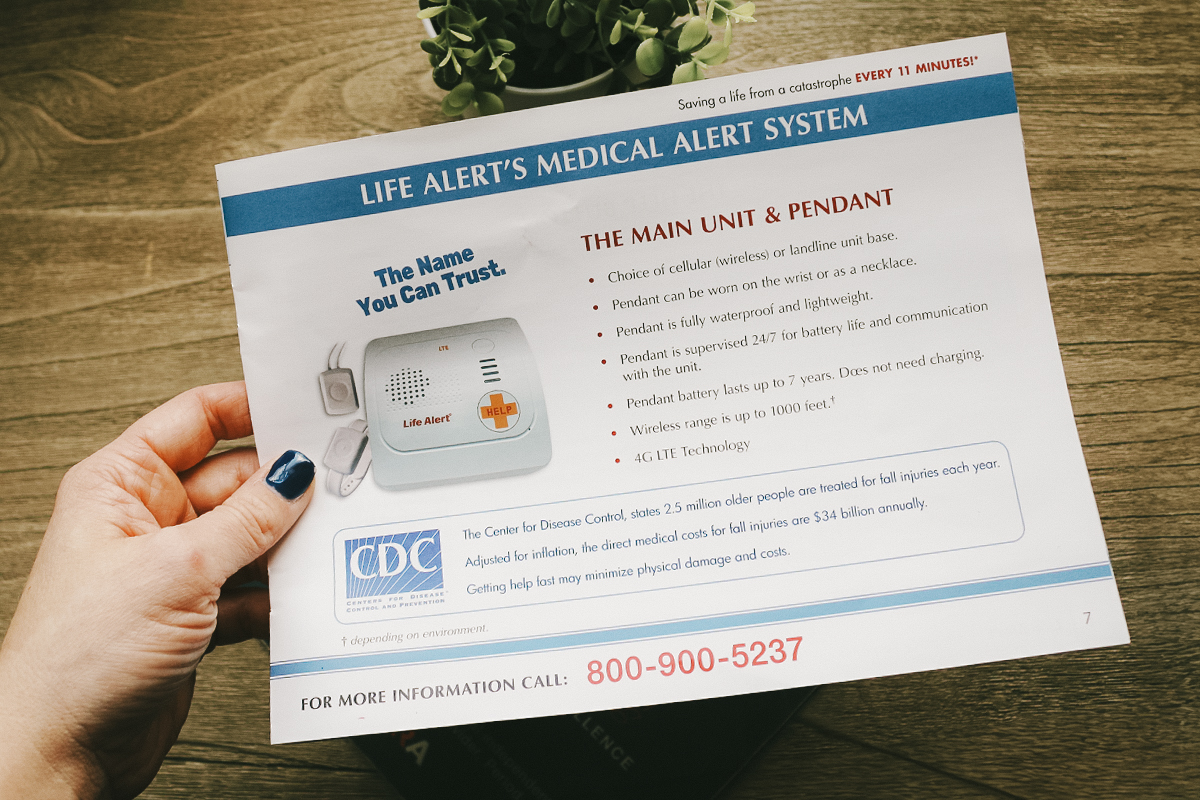
We also discovered that some of the information on the websites and Life Alert app is old and inaccurate. Life Alert no longer sells and monitors smoke alarms or carbon monoxide detectors, for example.
Finally, the only way to learn about products, prices, and contract terms is to call the Life Alert sales line, but the salespeople do not like to give straightforward answers. Two different Life Alert sales representatives said, “That’s not how we do things here,” when we asked for product pricing information and a copy of the contract.
3. Poor customer service
In our initial research, we read some Life Alert reviews describing the sales representatives as pushy. After spending 90 cumulative minutes on the phone with Life Alert sales representatives, we agree.
The salespeople started out friendly while explaining the products and services. As soon as we started to ask about seeing a contract, expressed reluctance to complete the sale, or declined to give out private information, like our grandmother’s name, address, and date of birth, the tone of the conversation shifted.
Our testers noted these experiences during phone calls with Life Alert sales reps:
- When asked about lower prices, one rep asked our tester if she cared more about money than about her mother.
- Another rep said if our tester didn’t make this purchase right away, they’d regret it if something bad ended up happening to their grandmother.
- We were also told other family members we wished to consult would “fall in line” if we just went ahead and paid for a system.
- One rep repeatedly claimed there was no reason for further research.
We understand that not every sales representative may take this approach, but we’ve read enough Life Alert reviews to know that our experiences are not unique. We’ve never encountered such poor customer service or aggressive sales tactics with other medical alert companies, even when representatives are clearly eager to make a sale.
We wondered if commissions-based pay might be the underlying motivation for these aggressive tactics, but we found no considerable difference in the pay structure of sales representatives from Life Alert, Medical Guardian, or Bay Alarm Medical. According to Glassdoor, commissions represent more than 30 percent of a sales representative’s yearly pay at all three companies. The difference likely boils down to sales training and company culture.
4. Some sales reps make false claims
Life Alert makes a number of misleading claims on its website, and some of the sales representatives we talked to told blatant lies. It was easy for us to spot inaccurate statements because we’ve been studying and reviewing medical alert systems for years, but we’re concerned that the average person shopping for a medical alert system would have no idea that Life Alert reps are bluffing just to make a sale.
Let’s take a look at some of those false claims.
“Only company legally allowed to bypass 911”
We were told that Life Alert is the only medical alert company legally allowed to bypass 911 and directly dispatch local emergency responders, thereby reducing the amount of time it takes for help to arrive.
The Life Alert salesperson encouraged us to “call any firehouse in the country” to confirm this. So, we did. We spoke with four emergency responders, and none reported receiving dispatch calls from any source other than 911.
Our Emergency Communications Centers may have been alerted by Life Alert, but I’ve never in my 25-year career been dispatched by some other entity other than a regional dispatch center. Alarm companies have zero authority to dispatch us.
Andy Bozzo, Contra Costa County Fire Captain and co-founder of Tablet Command
I have been with EMS for 27 years and have never been contacted directly by Life Alert.
Amy W., Lawrenceburg, Kentucky
Jared L. Ross, an emergency physician and paramedic who has also worked as an EMS dispatcher, doubts the existence of an “onsite dispatch center” at Life Alert headquarters. “With close to 25,000 EMS agencies in the U.S., no one can dispatch all of them,” he says.
“Anyone can legally call the local fire station, but that doesn’t mean anyone is going to pick up the phone. What if there is no one in the station?” says Dr. Ross. As for non-911 dispatches, Dr. Ross says they’re rare but do happen when one EMS unit dispatches another. “Critically, that second unit has a two-way radio. Without a radio or access to the local alerting system, no one is dispatching.”
“Only company that puts things in writing instead of giving a disclaimer”
Life Alert is the only medical alert company that requires a long-term contract, but that doesn’t mean other companies don’t put things in writing. Even brands that advertise “no contract” policies will require you to sign a service agreement.
The major difference between a contract with Life Alert and one with Medical Guardian, for example, is that you’re free to cancel with Medical Guardian at any time, whereas Life Alert will only honor a cancellation request if they receive the subscriber’s death certificate or proof of transfer to an assisted living facility.
We were unable to evaluate the Life Alert contract in detail because the company refused to send a copy to our testers without first receiving credit card details.
“Only company that doesn’t outsource monitoring outside the U.S.”
We’ve never encountered a U.S.-based medical alert company that outsources to a non-U.S. call center—and we’ve tested more than nine brands and researched a dozen more.
While some brands do outsource monitoring services to well-established firms like Rapid Response Monitoring, AvantGuard Monitoring Centers, or Affiliated Monitoring, others like ADT own and operate their monitoring centers, just like Life Alert. These monitoring centers also hold the same Five Diamond and UL certifications as the Life Alert call center.
“Only company that doesn’t use call-forwarding devices”
One sales representative claimed that all Life Alert competitors use “call forwarding devices,” which they said send emergency calls overseas where someone outside the United States transfers the call to local 911 dispatchers. We’ve never heard of this process, and it certainly does not describe the procedures used by the medical alert systems we review and recommend.
“Only medical alerts safe to use with pacemakers”
Life Alert buttons aren’t the only ones safe to use with pacemakers. In fact, all in-home medical alert buttons should be safe for people with pacemakers because they don’t contain magnets. That said, it’s smart to confirm this with each company before making a purchase.
Magnets are often used in speakers, so wearable medical alerts with built-in speakers represent more of a risk for people with pacemakers. This includes medical alert smartwatches, which the FDA recommends keeping at least 6 inches away from pacemakers.
But magnet-free mobile medical alerts are sold by other brands besides Life Alert. Bay Alarm Medical, for example, says its SOS Mobile GPS device uses zero magnets. You could also wear a mobile device in your pocket or on a belt clip to keep it a safe distance from the pacemaker.
Claims on the “Why our service is better” webpage
The LifeAlert.com page titled “Why our service is better” features a list of apparent perks associated with Life Alert.
- “We notify your family:” With your permission, all medical alert companies can follow up with family members, health care providers, and other caregivers after an emergency.
- “We stay on the line with you until the emergency is over:” Monitoring center staff members from Bay Alarm Medical also stay on the line with you until help arrives, and others we spoke to always stay on the line at the user’s request.
- “Lifetime free warranty:” Brands like Medical Guardian and Bay Alarm Medical also offer free equipment warranties for the duration of the service.
- “Professional installation nationwide:” Other companies don’t offer professional installation because their devices just need to be plugged in. In fact, a sales representative said that’s all it takes to install a Life Alert system too, but the company charges $197 for professional installation anyway.
5. You can’t read the contract before providing payment information
Life Alert refuses to send contracts to potential customers unless they provide credit card details. The contract comes in the box with the devices.
Mike Schmidt, an attorney with Schmidt and Clark LLP in Washington, D.C., cautions against giving credit card information before signing a contract, calling it “a risky and potentially illegal practice that violates the basic principles of contract law and consumer protection.” The Federal Trade Commission Act, the Truth in Lending Act, the Consumer Leasing Act, and the Fair Credit Billing Act protect your “right to read and understand terms and conditions of any contract before you agree to it,” Schmidt says.
You should never give your personal or financial information to a company that does not provide you with a clear and transparent contract.
Mike Schmidt, defense attorney at Schmidt and Clark LLP
You might assume Life Alert can’t charge your credit card if you don’t sign and return the contract, but Schmidt says you could still be at risk. “Even if you never return the signed contract, you may still be liable for the charges if the company claims you’ve accepted the contract by your conduct, such as by using the equipment, or by your silence, such as not objecting to the contract within a certain period of time.”
A class action lawsuit was filed in California against Life Alert Emergency Response, Inc. in 2021 for such scenarios, alleging that the company uses illegal “negative option” marketing tactics to get a person’s credit card information before they can read a contract and charges the card until the person tells the company to stop and returns the equipment. The lawsuit has yet to be resolved.
6. It’s difficult to cancel Life Alert
Based on what sales representatives have told us and what we’ve read in online reviews, Life Alert only allows customers to cancel the service under three conditions:
- Death of the user: A death certificate must be sent to Life Alert.
- User moves into a care facility: Documentation must be sent to Life Alert from “an accredited health or social service organization.”
- User receives 24/7 skilled in-home care: Documentation must be sent to Life Alert from “an accredited health or social service organization.”
No other medical alert systems do this. In fact, Medical Guardian and MobileHelp, among others, provide prorated refunds, ensuring you don’t pay any more than you have to.
Life Alert will provide a full refund if the user dies within the first three-year contract. However, when one tester said she was looking for information for her 100-year-old neighbor, the rep told her that Life Alert doesn’t like to sell to people that age because of their high risk of falling and injury.
7. You can’t buy a la carte products
There’s no way to purchase the Life Alert shower system or mobile alert separately. They must be bought as a bundled package:
- Package 1: In-home system only, $49.95 per month.
- Package 2: In-home system, shower system, $79.90 per month.
- Package 3: In-home system, shower system, mobile system, $98.85 per month.
If you or your care recipient is active outside the home, a mobile medical alert system is the best choice. Because it can be worn inside the home and in the shower, the mobile device can completely replace the in-home system and shower system, so paying for a shower system in addition to a mobile system may be redundant and pricey.
8. Life Alert doesn’t offer automatic fall detection
One essential piece of technology is missing from the Life Alert catalog: a fall detection device. Designed to call the monitoring center within seconds of detecting a fall, these wearable devices provide an extra layer of protection in case you or your care recipient can’t press the button.
We asked the Life Alert sales representative about fall detection devices, and they claimed Life Alert invented fall detection in 2011 but found it only 30 percent reliable and rife with problems. We looked up patents to verify this claim but found no documentation linking Life Alert to a fall detection device. Instead, we found fall detection patents not related to Life Alert dating back to 2004.
While it may be true that Life Alert attempted to release a fall detection device at one time, we’re concerned that the sales rep’s boastful but inaccurate statements may mislead customers who are looking for solutions to a legitimate problem.
We’re familiar with the limitations of fall detection because we’ve tested more than 16 of these devices hands-on in the office and in our homes. Fall detection technology has come a long way in the last 20 years, and while no device is guaranteed to detect every single fall due to a considerable number of variables, we know there are several devices on the market with excellent success rates. If automatic fall detection is your main concern, we recommend reading our full review of the best fall detection devices.
Did you know?
The original “I’ve fallen and I can’t get up” commercials that aired in the 1980s and 1990s were produced by Life Alert’s competitor, LifeCall. LifeCall owned the trademark for the popular slogan until 1999. Life Alert bought the trademark in 2001 and has aired similar commercials ever since.
9. Caregivers can’t track GPS location
It’s easy to assume one GPS medical alert is like any other, but that’s not the case.
Some pair with a smartphone app that allows authorized users to see the device’s location. This is a simple and convenient way to see where someone is if they’re ever out of touch. Caregivers may also appreciate being able to see the device’s GPS reliability firsthand.
Other mobile devices, including the one sold by Life Alert, do not have a caregiver integration. Instead, the device’s location is shared with the monitoring center when the button is pushed. This method saves battery life by reducing the amount of communication that occurs between the device and GPS satellites, but it limits the ways the device can be used every day and in emergency situations.
10. Life Alert costs twice as much as the competition
Unless you plan to really lean into the non-emergency concierge service, there’s little reason to choose Life Alert over a competitor like Medical Guardian, MobileHelp, or Bay Alarm Medical.
The most expensive medical alerts from these companies cost about the same as the least expensive system from Life Alert. You get far more value for your money with these brands compared to Life Alert thanks to more functional equipment, more device options, greater buying flexibility, and the freedom to cancel at any time.
We’ll take a closer look at how much Life Alert costs compared to the best alternatives below.
Unverified claim: Life Alert can share your health history with dispatchers
Life Alert claims to be the only HIPAA-compliant medical alert company, which allows them to share your health history over the phone with dispatchers. They can warn first responders that you have a pacemaker, for example, or that you’re diabetic, which could impact your treatment even if it’s not directly related to your emergency. This only impacts health history. Any monitoring center can share the details of your emergency with 911.
We were not able to verify the HIPAA status of Life Alert because the company would not send us a copy of their contract without a credit card on file, so we’re trusting this claim at face value.
That said, we confirmed that other medical alert companies do not share health history over the phone. Instead, they send you a form called a Vial of Life. After documenting your health history, emergency contacts, and provider preferences on the form, you hang it on the fridge. The monitoring center staff members at these companies will tell first responders to look for the Vial of Life to get your health history.
Key features of Life Alert
Standard features
Here’s what you can expect from a Life Alert system:
- Three-year contract with price lock.
- Lifetime warranty.
- Button batteries last six to 10 years.
- 72-hour backup battery in base unit.
- Waterproof help buttons.
Optional features
Life Alert offers few optional features. Here’s the extent of your choices:
- Cellular vs. landline base station.
- Upgraded package with shower button.
- Upgraded package with shower button and mobile system.
How much does Life Alert cost?
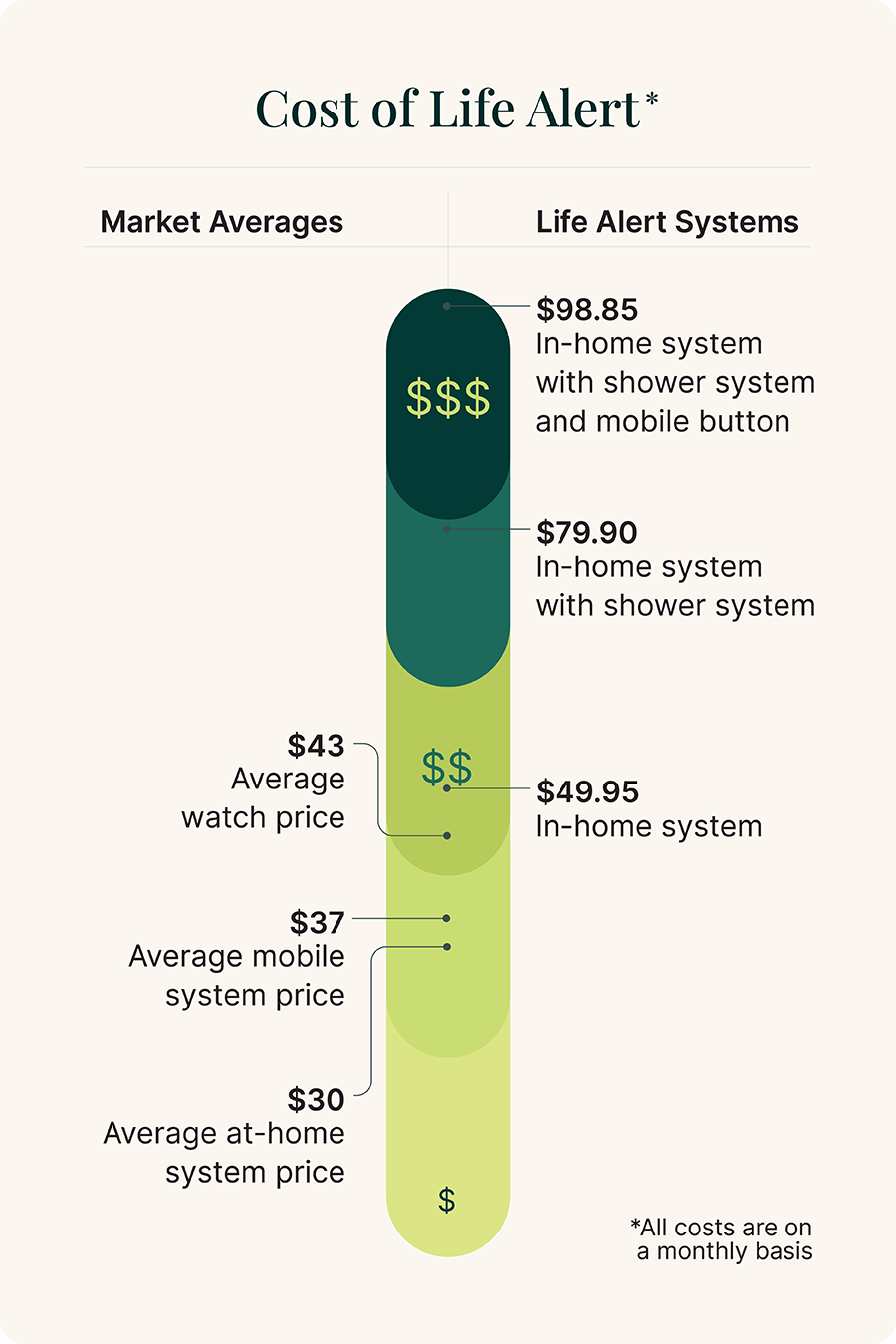
Life Alert prices start at $49.95 per month for a basic in-home system. Adding a shower button increases the price to $79.95. Adding a mobile device brings the monthly total to $98.85.
Life Alert doesn’t charge equipment fees but charges a one-time fee of $197. The company calls this the “installation fee” even though you install the system yourself with phone support.
Because Life Alert requires a three-year contract, you’ll spend around $2,000–$3,800 total. Life Alert only gives refunds if the user dies during the initial three-year contract.
Life Alert could also charge a $100 lost equipment fee if you fail to return the devices after canceling. We were unable to confirm the monthly cost of add-on equipment, like an extra pendant or shower button.
| Package | Monthly fee | Installation fee | Equipment fee | 36-month total |
|---|---|---|---|---|
| In-home system | $49.95 | $197 | $0 | $1,996.20 |
| In-home system + shower button | $79.90 | $197 | $0 | $3,074.40 |
| In-home system + shower button + mobile system | $98.85 | $197 | $0 | $3,756.60 |
Best Life Alert alternatives
Medical Guardian, MobileHelp, and Bay Alarm Medical top our list of the best medical alert systems and are our recommended Life Alert alternatives.
If you were attracted to Life Alert because it’s a long-standing company, you’ll appreciate that each of these brands has been in business for at least 15 years. We’ve been consistently impressed with the products, services, policies, and customer care offered by all three companies throughout our testing experiences.
Medical Guardian: Best mobile system
Medical Guardian is our overall pick for the best medical alert system thanks to an innovative and diverse product line, above-average fall detection performance, and attentive customer service. The company regularly releases new products based on customer feedback, such as the MGMini Lite, a simple fall-detection device worn on a wristband instead of around the neck.
Like Life Alert, Medical Guardian offers a free lifetime warranty for equipment wear and tear. It’s easy to cancel service with Medical Guardian, and the company will even give you a prorated refund for unused monitoring time if you paid in advance.
Read our complete Medical Guardian review to learn more.
MobileHelp: Best value
If you want an affordable in-home medical alert system, MobileHelp offers the best value on the market. The brand’s in-home cellular system, the MobileHelp Classic, costs $19.95 per month, which is the least expensive price we’ve seen for the same type of device. The brand’s on-the-go devices are priced higher, but MobileHelp is by no means as expensive as Life Alert.
As with Life Alert, you never pay an equipment fee when using MobileHelp devices. A lifetime warranty and two-year price guarantee are available for an extra $6 per month, which also unlocks product and service discounts and waives any fees for lost or damaged equipment. You can cancel at any time and will receive a prorated refund.
Bay Alarm Medical: Best at-home fall detection
Bay Alarm Medical is our choice for at-home fall detection because the brand’s necklace proved more sensitive and effective during our fall tests than any other at-home device. The fall detection necklace automatically called the monitoring center after all three hard, fast falls and all three soft, slow falls. Although Life Alert claims fall detection devices don’t work, we know this one does. That said, this technology isn’t guaranteed to detect all falls, so it’s important to conduct regular check-ins when you or a care recipient has a high fall risk.
Bay Alarm Medical treats its customers to a one-year price lock guarantee, a 30-day trial period, and a free lifetime warranty for wear-and-tear without a long-term contract.
Our final verdict
Ultimately, the Handbook Team does not recommend Life Alert. The company’s current sales process provides no consumer transparency and prevents people from seeing written prices or policies until they provide personal information and a credit card number. There’s a good chance you will be treated poorly if you call the sales line to ask a question, and you’re given no option to buy the mobile device or shower button separately to lower the total monthly cost.
We’d like to see Life Alert completely overhaul its website so that customers can see all prices and read the contract without having to call. It’s also apparent the sales team needs further training to accurately represent Life Alert products and services and to treat potential customers—who are often in a vulnerable state after a fall or other medical emergency—with respect.
The few verifiably unique qualities of Life Alert do not redeem the company, in our opinion, and we recommend shopping elsewhere for medical alert devices.
Frequently asked questions
No, original Medicare (Parts A & B) doesn’t pay for Life Alert. Medical alert systems may be covered under Medicare Part C, a Medicaid Waiver, or a long-term care insurance plan. Contact your insurance provider or read your Explanation of Benefits document for details.
Based on our tests, we think Medical Guardian, MobileHelp, and Bay Alarm Medical are the best alternatives to Life Alert.
Because Life Alert is the most expensive medical alert system on the market, any alternative brand will be cheaper. For example, you can get an in-home system from MobileHelp for $19.95 per month, whereas Life Alert sells the same type of system for $49.95 per month.
Life Alert buttons are waterproof and can be worn in the shower or bath.
According to Life Alert, the base unit’s backup battery lasts up to 72 hours.
Life Alert says it uses GSM bands, which means the devices will work anywhere AT&T and T-Mobile networks exist, but won’t work if the only options are Verizon or U.S. Cellular. Use the Federal Communication Commission 4G LTE map to confirm coverage in your area.
- Ang, G. C., Low, S.L., and How, C.H. (2020). Approach to falls among the elderly in the community. Singapore Medical Journal, 61(3), 116-121. Link
- Carter, José. (14 January 2023). Speaker magnets: What do magnets in speakers do? Nucoustics. Link
- Centers for Disease Control and Prevention. (2021, April 21). Loneliness and social isolation linked to serious health conditions. Link
- De San Miguel, K., Lewin, G., Burton, E., Howat, P., Boldy, D., and Toye, C. (2017). Personal emergency alarms: Do health outcomes differ for purchasers and nonpurchasers? Home Health Services Quarterly, 36(3), 164-177. Link
- Moreland, B.L., Kakara, R., Haddad, Y.K., Shakya, I., and Bergen, G. (2020). A descriptive analysis of location of older adult falls that resulted in emergency department visits in the United States, 2015. American Journal of Lifestyle Medicine, 15(6), 590-597. Link
- Roush, R.E. and Teasdale, T.A. (2011). Personal emergency response services: Do the benefits justify the cost in seniors housing and care properties? Seniors Housing & Care Journal, 19(1), 73-82. Link
- U.S. Food and Drug Administration. (13 May 2021). Magnets in cell phones and smart watches may affect pacemakers and other implanted medical devices. Link







